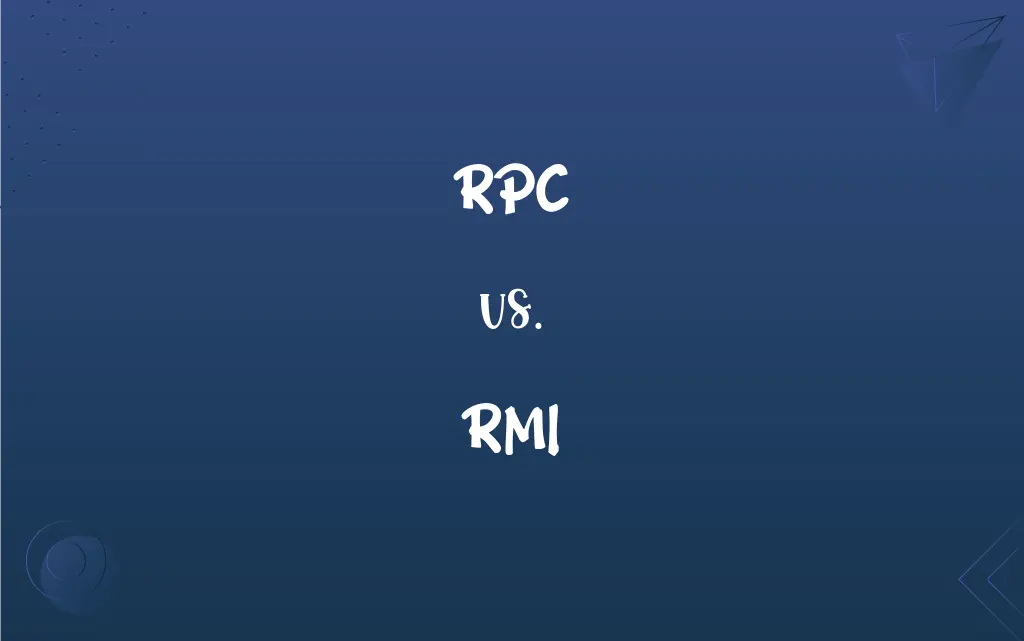RPC vs. RMI: What's the Difference?
Edited by Aimie Carlson || By Harlon Moss || Published on February 8, 2024
RPC (Remote Procedure Call) is a protocol that allows a program to execute a procedure on another computer, while RMI (Remote Method Invocation) is a Java API that performs a similar function but is object-oriented and Java-specific.

Key Differences
RPC is a protocol used for executing a procedure in a remote system as if it were a local call, simplifying the communication process between computers. In contrast, RMI, specific to Java, enables the invocation of methods on remote Java objects, seamlessly integrating with Java's object-oriented features.
RPC is language-independent and can be implemented in various programming environments, offering flexibility in cross-platform interactions. RMI, however, is designed specifically for Java, ensuring tight integration with Java's features, like garbage collection and exception handling.
In RPC, the focus is on the procedure and the data types being transmitted between systems. RMI extends this by focusing on objects and the methods being invoked, adhering to the principles of object-oriented programming.
RPC abstracts the network communication, allowing developers to focus on the business logic rather than the underlying network details. RMI, while also abstracting the network details, further encapsulates this within the Java ecosystem, offering a more seamless experience for Java developers.
Error handling in RPC often involves checking return values and error codes, whereas RMI leverages Java's exception mechanism, providing a more robust and consistent error-handling framework within Java applications.
ADVERTISEMENT
Comparison Chart
Language Compatibility
Language-independent, versatile for various platforms
Java-specific, integrated with Java features
Programming Paradigm
Procedure-oriented, focuses on data types and procedures
Object-oriented, focuses on objects and methods
Implementation Flexibility
Can be used in multiple environments
Limited to Java environment
Integration with Language Features
General network communication abstraction
Tightly integrated with Java's object model and features
Error Handling
Based on return values and error codes
Utilizes Java's exception handling mechanism
ADVERTISEMENT
RPC and RMI Definitions
RPC
RPC is versatile and can be implemented in various programming languages.
They implemented an RPC mechanism in their Python and C++ services.
RMI
RMI enables Java objects to invoke methods on remote Java objects.
Their Java application used RMI to interact with the remote object's methods.
RPC
It abstracts the complexities of network communication.
With RPC, developers didn't have to worry about the underlying network protocols.
RMI
RMI uses Java's built-in security and garbage collection features.
They utilized RMI's integration with Java's security features to ensure safe remote interactions.
RPC
RPC allows a program to call a procedure on a different computer in a network.
The application used RPC to retrieve data from the server.
RMI
RMI is specific to Java, providing a framework for remote method calls within Java applications.
The Java service leveraged RMI for remote method invocation across servers.
RPC
It enables inter-process communication over a network.
RPC was crucial for communication between the distributed components of their system.
RMI
It integrates seamlessly with Java's object-oriented programming model.
RMI facilitated object-oriented remote interactions in their Java-based system.
RPC
RPC is procedure-oriented, focusing on executing remote procedures.
The system's architecture was based on RPC for executing remote database queries.
RMI
It handles the complexities of Java object serialization and network communication.
RMI automatically managed the serialization of Java objects sent over the network.
FAQs
What does RMI stand for?
RMI stands for Remote Method Invocation, a Java-specific framework.
Is RPC suitable for object-oriented programming?
RPC is more procedure-oriented and not specifically tailored for object-oriented programming.
Can RPC be used in distributed systems?
Yes, RPC is commonly used in distributed systems for inter-process communication.
What is RPC?
RPC is a protocol that enables software to call a procedure on a remote server as if it were local.
Are RPC and RMI secure?
Both can be made secure, but RMI benefits from Java's built-in security features.
Can RMI be used outside of Java?
No, RMI is exclusive to Java and cannot be used with other programming languages.
Is RMI limited to certain types of applications?
RMI is best suited for Java-based applications that require remote method invocation.
Can RPC work with different programming languages simultaneously?
Yes, RPC can be implemented across different programming languages, making it versatile for cross-platform communication.
How does RMI integrate with Java’s garbage collection?
RMI integrates with Java's garbage collection to automatically manage the lifecycle of remote objects.
How do RPC and RMI differ in language support?
RPC is language-independent, while RMI is specifically designed for Java.
How does error handling differ in RPC and RMI?
RPC typically uses return values and error codes, while RMI utilizes Java's exception handling mechanism.
Does RMI support communication between Java and non-Java applications?
No, RMI is designed exclusively for Java-to-Java communication.
Can RPC be used for asynchronous communication?
While traditionally used for synchronous calls, modern RPC implementations can support asynchronous communication.
What are the key benefits of RMI in Java applications?
RMI provides seamless integration with Java's features, simplifying remote method invocation in Java applications.
How does RPC handle network communication?
RPC abstracts the network communication details, allowing developers to focus on the business logic.
What are the performance considerations for RPC and RMI?
Both RPC and RMI can have performance overhead due to network latency, but RMI also adds the overhead of Java object serialization.
What makes RMI a preferred choice for Java developers?
RMI's seamless integration with Java's object model and built-in features makes it a preferred choice for remote interactions in Java applications.
Are there any specific network protocols associated with RPC?
RPC can work with various network protocols, including TCP/IP and HTTP.
What is a typical use case for RPC?
RPC is often used for server-client communication in networked applications.
How do RMI and RPC handle data serialization?
RPC requires manual handling of data serialization, while RMI automatically handles serialization of Java objects.
About Author
Written by
Harlon MossHarlon is a seasoned quality moderator and accomplished content writer for Difference Wiki. An alumnus of the prestigious University of California, he earned his degree in Computer Science. Leveraging his academic background, Harlon brings a meticulous and informed perspective to his work, ensuring content accuracy and excellence.
Edited by
Aimie CarlsonAimie Carlson, holding a master's degree in English literature, is a fervent English language enthusiast. She lends her writing talents to Difference Wiki, a prominent website that specializes in comparisons, offering readers insightful analyses that both captivate and inform.































































